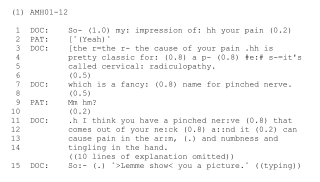Health
Doctor Still Knows Best
Polite patient disagreement has little effect on how doctors diagnose and treat.
Posted April 17, 2024 Reviewed by Monica Vilhauer
Key points
- A new study of clinic conversations shows how patients try to self-advocate when they doubt their doctor.
- Demurral — polite resistance — is a common strategy.
- Ultimately, demurral does little to change doctors' diagnoses and resulting treatment plans.
You have new symptoms that are scary, surprising, or painful. You decide to visit your primary care doctor. You hope for a clear diagnosis and a plan for treatment. But when you get there and start explaining your problem, you may feel the doctor isn’t listening and is ignoring key points you think are important. So, you aren’t convinced their diagnosis is correct.
In a pre-internet world, the gap between what doctors knew and what patients could research was vast. We now live in a world where anyone can take stock of their symptoms via Google and join community forums on how to self-advocate in an often overwhelming medical system. This should be dramatically changing how patients interact with their primary care doctors, and with it the traditional flow of getting to a diagnosis and then identifying treatment. Patient concerns should be better met.
But what do contemporary patients do when faced with doubts about a doctor's diagnosis? Has this unleashing of medical knowledge via the internet and social media made patients more willing and able to guide their own diagnosis? There are a lot of ways social scientists could approach this question, and one is looking at how conversations between doctors and patients unfold during an office visit. In a recent study reported in the journal Social Science and Medicine, researchers recorded 75 primary care encounters in southern California. Patients were dealing with common complaints, like knee pain, skin rashes, or digestive distress.

By detailing the shifts in language as discussion moves toward a diagnosis, researchers can identify underlying but crucial moments when and how patients push back — often quietly — against diagnoses they don’t agree with, and how doctors then respond. This study shows how, when patients haven’t had their concerns fully addressed, often demur. They use soft language, peppering their requests with “perhaps” or “maybe," and ask more questions even as the doctor has decided what the problem is. And they do this polite resistance a lot, more than previously studied cases that didn’t track language so carefully had identified.
A patient’s statement like “I don’t think the pain is actually starting in my neck” or “is there any chance we can get an x-ray to confirm that?” when diagnosed with a cervical radiculopathy (pinched nerve in their neck) is an example of how this can work.
But, ultimately, tracing conversations through diagnosis and into a finalized treatment plan shows the result of such demurral is much the same, and rarely shifts the doctor's diagnosis. Rather than interpreting this conversational effort as a sign that a patient’s concerns are unresolved, the physicians in this study often responded to it as a challenge and defended their already-stated diagnosis. With this response, patients ultimately conceded to the authority of the doctor. The one thing patient demurral did elicit was agreement to order more tests, although the doctor might also note “they won’t find anything.”
So, while patients may bring lots of ideas and a desire to be fully heard to a doctor-interaction, making those work in the context of navigating a diagnosis is hard and often ineffective work. These California cases show that when people seek a medical solution at the clinic to what ails them, they are pretty much agreeing to go along with "doctor knows best," regardless of their intentions and efforts.
References
McArthur, A. (2024). When patients demur: Resisting diagnostic closure in US primary care. Social Science & Medicine, 344, 116619.


